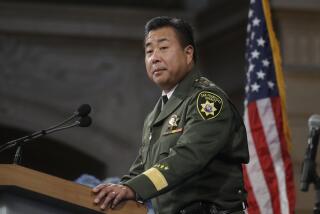Do Not Be Alarmed: Edison Field ‘Terrorist Attack’ Is Only a Test
The 911 call will come in at 9 this morning: A chemical weapon attack at Anaheim’s Edison Field. More than 100 people injured.
The call is expected to trigger a massive response from hundreds of paramedics, hazardous-materials specialists and law enforcement officials this morning, when authorities kick off one of the largest simulated terrorist attacks in the country.
More than 50 agencies--from the FBI and the Defense Department to local police and fire agencies--will respond. About 40 firetrucks and two dozen ambulances will rush to the scene. Role players pretending to be victims in the attack will be rushed to more than a dozen hospitals, all on high alert.
“This is huge,” said Anaheim Police Sgt. Rick Martinez, who warned passersby not to panic when they see the crush of emergency cruisers at the venue. “The public should not be alarmed.”
The exercise, which will involve more than 1,000 people in all, is part of a nationwide effort to ensure that local and state emergency crews can deal with the horrors of a nuclear, biological or chemical attack.
Since 1997, more than 50 cities and counties nationwide have held drills similar to the one scheduled for today. Orange County’s simulation comes five years after local authorities rushed to Disneyland in response to a threat to unleash a nerve gas inside the park.
That threat turned out to be a hoax. But the incident--along with the 1993 bombing of the World Trade Center in New York and a chemical weapons attack two years later on the Tokyo subway that killed 12 and sickened thousands--helped renew concern that the country is vulnerable to terrorists.
Over the past three years, the United States has spent more than $153 million to help local agencies prepare for similar attacks. And although there is no evidence that Edison Field or any other local landmarks are currently being targeted, local officials say they welcome the chance for a rehearsal just in case.
“We’d rather practice for things that we don’t have to deal with rather than be caught unprepared if something does happen,” Martinez said.
More to Read
Sign up for Essential California
The most important California stories and recommendations in your inbox every morning.
You may occasionally receive promotional content from the Los Angeles Times.











